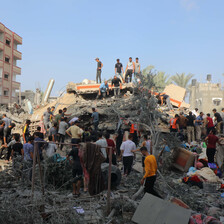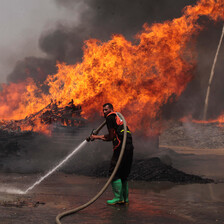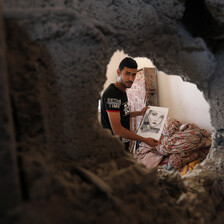The Electronic Intifada 9 November 2023

Finding basic necessities requires an enormous effort in Gaza.
APA imagesI did not expect the war would continue for so long. We have been under constant bombardment for over a month now.
How much more must we lose before the attack stops?
The losses we have endured are already overwhelming.
I am mourning the death of Ashwaq Jondiyya – Um Ali, as she preferred to be called. She was a talented architect and a mother of two.
I would often comment playfully on how beautiful her eyeliner looked.
She would respond by joking about how she was an architect who drew buildings. Applying make-up, she inferred, was not her strong point.
I try to sleep amid the deafening sounds from bombs, warplanes and tanks.
The noise intensifies and becomes more terrifying after dark.
Out in the streets, I can hear numerous stray dogs barking.
I do not know if they are hungry or scared. Just like us.
I toss and turn until finally, exhaustion takes over and I drift into sleep.
I cherish the first few minutes after I wake up in the morning. During this time, I forget where I am or what is happening.
It is a fleeing moment of blissful ignorance and I yearn to prolong it indefinitely.
Then my life as a Gazan starts.
I have persistent headaches and often feel dizzy.
Normally, I would attribute such symptoms to dehydration and promptly drink some water. Now I try to hide my discomfort.
I don’t want to burden anyone. I don’t want them to think that they must offer me water.
Water crisis
I feel compelled to keep any water that’s available for children who cannot comprehend just how serious our water crisis is.
One day recently, my headache got so severe that I reached for water from a jug. To my dismay, I discovered it was brackish and unfit for drinking.
I immediately spat it out.
On Twitter, people share tips on how to make water safe for drinking. Boiling is suggested as a solution.
But we have a limited amount of fuel in the cylinders we use for cooking. We are preserving that fuel for emergencies.
Our need to use fuel sparingly means that we can’t really follow this advice. Having a simple glass of clean water is a major challenge.
We have abandoned the tradition of having three meals a day. Now, we have to get by with a single meal.
We now feel that we must minimize our need to visit the bathroom. There is no water for washing or flushing.
When I was able to use the bathroom in my sister’s home, I felt very lucky for a brief moment.
My uncle, his wife and his four unmarried daughters have gone to a school run by the UN agency for Palestine refugees (UNRWA). They described the conditions there as miserable.
Marah, one of my cousins, told me, “I feel filthy. I smell awful.”
We all feel like that now.
It is especially hard for women who get their period while taking shelter in a school.
Under normal circumstances, we would be able to have a daily shower. That is a luxury we can no longer afford.
Privilege?
We have been forced to reassess the whole concept of privilege.
It is a privilege now to have a little water to drink.
It is a privilege to have a little water to wash.
It is a privilege to have a little water for ablution before prayers.
It is a privilege to have some food for lunch.
It is a privilege to have some electricity so that you can charge your phone.
Fetching water is a team effort.
My 14-year-old nephew goes to see a man who has a cart, asking “Do you have any water?” If the answer is “yes,” my nephew stands in a line for at least two hours, often three hours or even longer.
Next, he brings the water to our home in jerrycans. My sister and I assist him in carrying the jerrycans upstairs.
When I have a few rare moments of quiet and solitude, I find myself reflecting on life’s twists and turns.
I keep a diary and had always envisioned its pages would be filled with musings about films I’ve seen, that I would describe my swimming adventures, that I would write lighthearted tales.
I never thought I would use my diary to chronicle a war as terrible as the one Israel is now waging against Gaza. Yet here I am, a witness to extreme brutality.
Gone are the carefree days of leisurely pursuits. Now I am busy with the arduous tasks of survival.
I have become a provider for my family.
I am part of a team that has to fetch water. I am responsible for preparing meals and baking over an open fire.
The weight of responsibility hangs heavily upon me. There are nights when sleep eludes me, when the horrors I have witnessed replay in my mind like a relentless film reel.
The innocence I once possessed has been shattered, replaced by a somber understanding of the realities of war.
I have seen despair etched on the faces of mothers who have lost their children and other family members, or whose family members are still under rubble.
I have heard the cries of wounded people shouting for an ambulance. Because there was no electricity to charge batteries, they could not call the emergency services on their mobile phones.
I long for my past life.
Ghada Al-Haddad is a journalist based in Gaza.





